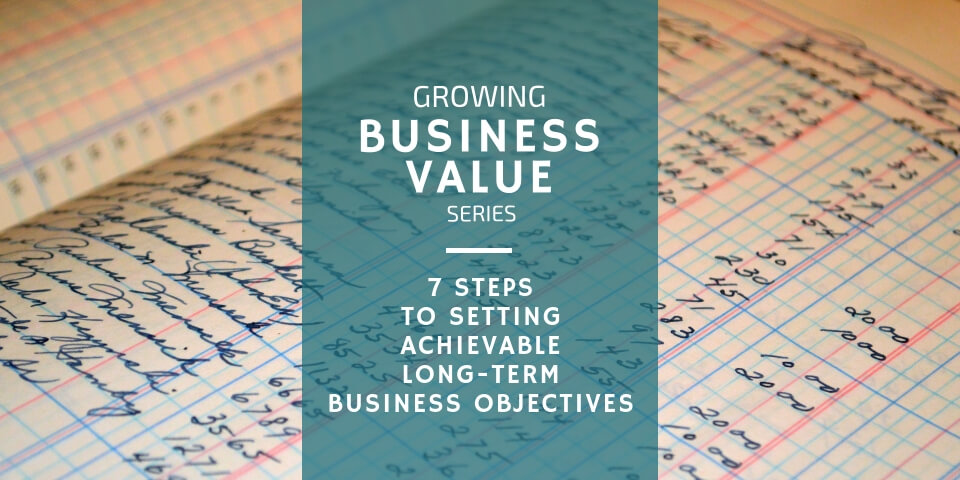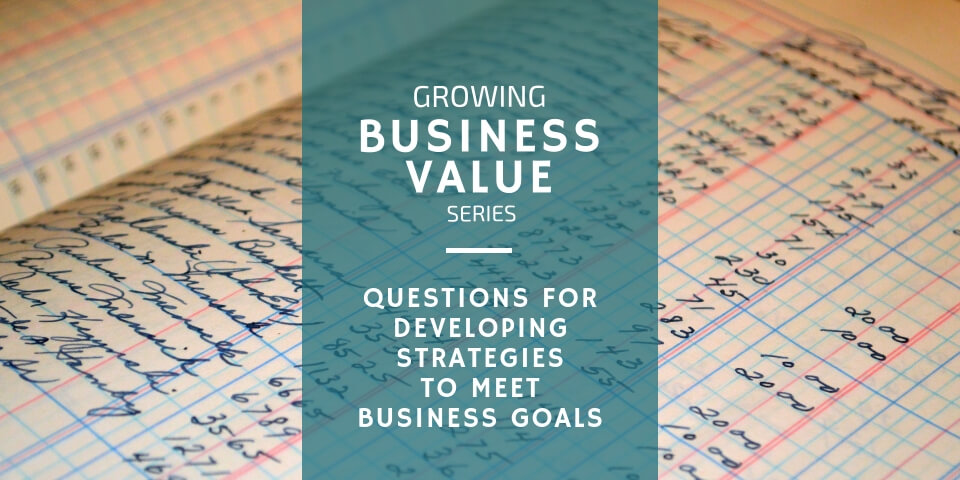
7 Steps to Setting Achievable Long-term Objectives in Business
December 17, 2018
3 Questions to Ask When Developing Strategies to Meet Business Goals
December 24, 2018Why Would Anyone Buy Your Business? The Buyers Want List

If you’re trying to build a business that’s valuable, to whom is it valuable? Do you want to improve your business for yourself? Your family? Employees? Customers? Why does improving your business even matter? Well, it may not matter if you want to close it and walk away from it down the road. However, if you want to sell your business in the future, then building value in your company matters a great deal. Ultimately, the quantitative and qualitative value of your business will determine how much a buyer will pay you for your business. Your final customer will be your business’s buyer. Therefore, you must make your business attractive to them. But how do you do that? Well, I’m going to give you the list of 6 aspects that business buyers look for when assessing a company.
My First Love
As a teenager, I fell in love with a thing. You see, my aunt purchased a royal blue, 25th edition, 1992 RS Camaro convertible. Let me tell you; this car was a thing of beauty. It even had a CD player in it during a time when cars only had tape decks. Because it was a special edition, there were only 272 cars made like this one, and it was number one on my 13-year-old “one of these days” want list.
When I turned 17, my aunt let me borrow the car for my very first date. Yep, I was Mr. Cool. I pulled up to my date’s house with the top down and some country music playing. Yeah… great memories!
Now fast forward some 17 years. My aunt calls me out of the blue and says, “Justin, would you like to buy my Camaro?” Wait, what? Hold the horses! I’m like, “Yeah! You mean, I could actually own my dream car?” You have to understand. My aunt lived on St. Simon’s Island, Georgia, and she hardly drove the car anywhere. In fact, after 20 years, she’d only driven it 30,000 miles, and it was in immaculate condition. Because of the memories, I had in this car and the connection I had to this car, it was very enticing to me. I saw more value in it than others, like car collectors, might see in it. It had both quantitative and qualitative value to me. So ultimately, I bought the car, and it was a dream come true.
Your First Love
Your business may be your “Camaro.” With hopes of making money and living high on the hog, you’ve poured your heart and soul into your company. You’ve dreamed of the day your business will “make it big.” You’re emotionally attached to it. It’s similar to your first love. But that emotional attachment can cause you to lose your objectivity. While your business is extremely valuable to you, it may not be valuable to anyone else. Maybe you’ve increased your profit margins but neglected your business’s visual appearance or its online presence. Perhaps you’ve made financial decisions without calculating the cost of capital, and now your business is exposed to unnecessary risk.
No matter where you are in the life of your business, you can add quantitative and qualitative value to it. Adding both types of value to your business will entice business buyers in the future. So let’s look at some basic ways to increase the value of your business to get it on a business buyers’ want list.
Valuable “Wants” That Business Buyers Look For:
#1 – Is it a profitable business?
Okay, okay. I know I’ve already told you that profitability is not the same thing as value. However, no one will want your business if it’s not profitable. Who wants to buy a business that doesn’t make any money? Now, I’m not talking about your company’s top-line revenue, sales, or income. Profitability is the difference between what you bring into the company and what you spend out of it. In other words, your income minus your expenses equal your profit.
Many times, business owners will have banner years for revenue, but their expenses destroy their profit margins. If you’re increasing your revenue without decreasing or maintaining your current expenses, then increasing sales won’t make a difference to your bottom line. Yes, you need more customers and more sales. But you also need to increase your profit margins to make your business attractive to future buyers.
#2 – Does it have repetitive profitability?
Once your business becomes profitable, can you consistently repeat those profitable results? If the net income (the profit margin) of your company is not repeatable, then your business’s value will suffer. You don’t want to hit the occasional “home run.” You want to be profitable year after year after year. We want to consistently hit base hits and strive for a .500 batting average! The more repeatable your business’s profit is, the more value others will see in it. It’s a pretty simple calculation.
#3 – Does it have predictable revenue?
If your business is profitable and that profitability is repeatable, then is it predictable? Can you forecast your company’s yearly income and expenses? Can you consistently project what your revenue will look like 3 months from now, 6 months from now, or a year from now? If your company’s sales are fickle, unpredictable, or seasonal, then buyers may offer you less money for your business than you think it’s worth. Therefore, you must develop a model of recurring revenue.
But how do you do that? How do you guarantee that your business will bring in a certain amount of revenue each month? Well, you create monthly subscriptions or offer yearly contracts if you’re in the service industry. Have your clients, patients, or customers subscribe to your services and break their payments into equal monthly installments. If you manufacture or sell goods rather than services, have customers sign-up to receive their favorite products monthly, quarterly, or yearly. Creating a model of recurring revenue can be done, and it will make your business more attractive to potential buyers.
#4 – Does it have sustainable profitability?
As your revenue becomes more predictable, your profitability can become more sustainable. Just as you can develop a model for recurring income, you can predict recurring expenses. By anticipating both income and expenses, you can consistently gauge your profit margins and make sure they are viable for long-term growth and sustainability. Are your profit margins high enough and consistent enough to sustain you through economic fluctuations and cycles? Can your business survive costs of litigation or legislative changes in the government? Are your margins high enough to allow you to purchase new technologies as needed and compete with others in your marketplace? Your business cannot remain standing through the storms without sustainable profitability. If it doesn’t last, it isn’t valuable to anyone.
#5 – Does it have credible financial records?
Although this point is pretty straightforward, I still need to say it. Are your income and expense predictions based on realistic and historic numbers? Have you tracked your income and expenses throughout the years in order to know what your profit margins are? Can you offer evidence of your historic growth rate? Or, are you just guessing? If you’re just “guessing” that your income will be a $X amount this year without basing it on your company’s factual financial reports, then no one will believe your profit predictions. No one will buy a company that can’t prove its merits.
#6 – Is it a transferable business?
This last point is the Achilles heel for many business owners. People tell me all the time that they’re business owners. However, the reality is that all too often these ‘business owners’ are really just highly paid employees with their names on a document. If your business is centered solely around you, your abilities, your work, your creations, your management, or your service, then it’s not a sellable business no matter how high, predictable, sustainable, or accurate your profits are. Why not? Because it’s not transferable. A true business is one that can operate without the business owner present. That’s a business. Therefore, in order to increase the value of your business, you must build a business that’s surrounded by a good team that’s able to operate without you present. Only then will it entice business buyers.
RELATED ARTICLE: The Types of Business Buyers Likely to Purchase Your Company
A Complete Want List = Your Path to Retirement
Making your business enticing and attractive to buyers is NOT an easy or quick task. These 6 steps may sound simple to do, but they do take time. You must make an effort to grow the value of your company. Yet, you must concentrate your efforts on building value to SELL the company. Building value in your company doesn’t just provide you with monthly income and present-day wealth; it can be your ticket to retirement if you make your business valuable enough to sell for maximum profit.



